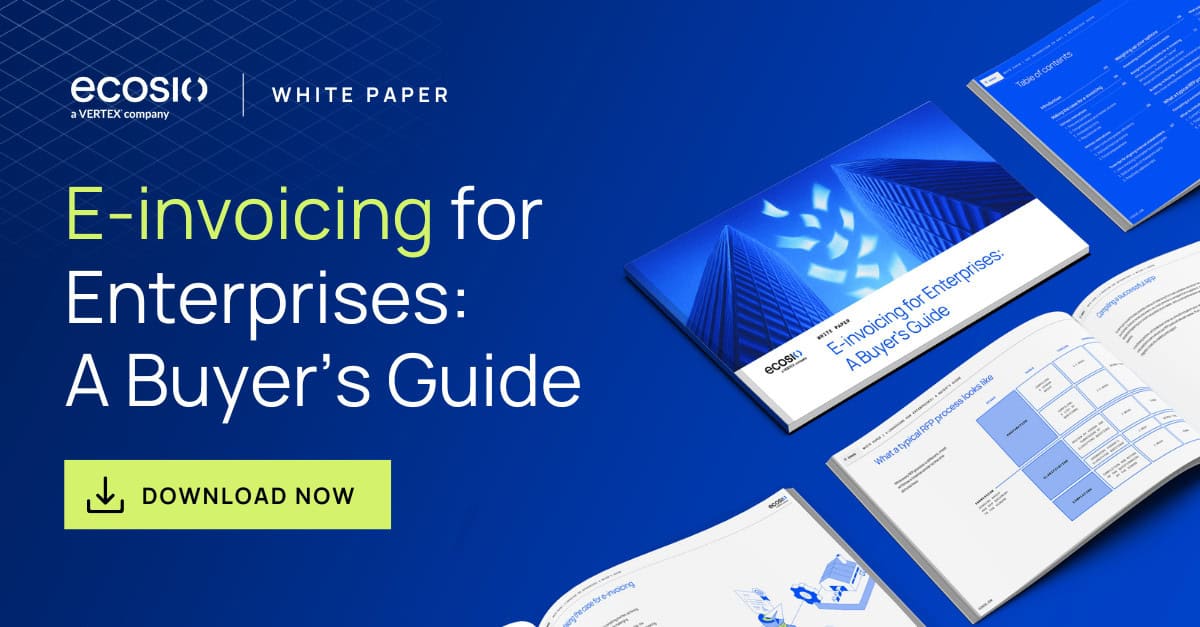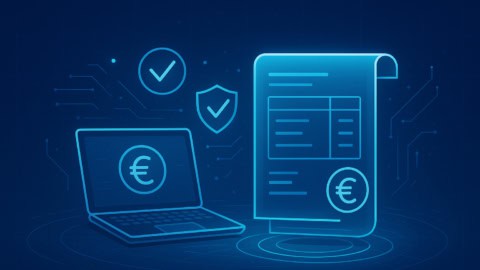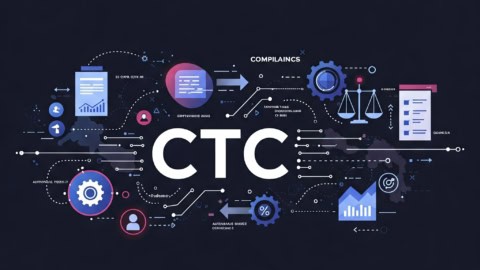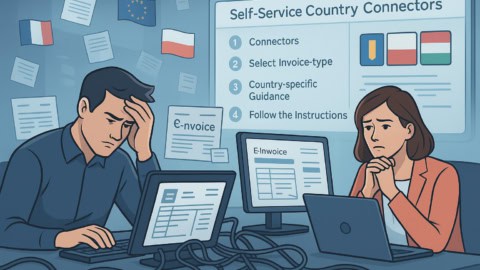TL;DR – Key takeaways from our e-invoicing RFP questions guide
- A strong e-invoicing RFP should go beyond functionality to uncover how each vendor handles compliance, scalability, and long-term reliability
- Grouping RFP questions into clear categories makes it easier to evaluate e-invoicing vendors objectively and compare like-for-like
- Asking about regulatory coverage and certifications helps identify providers that can future-proof your compliance strategy across multiple markets
- Including questions on monitoring, reporting, and data protection will help you ensure operational transparency and business continuity
- Security and support-related questions will reveal whether vendors are trusted partners or just technology providers
When it comes to choosing the right e-invoicing partner, asking the right questions can make all the difference. A strong e-invoicing request for proposal (RFP) not only helps you identify functional requirements but also uncovers how well each provider can meet your compliance, scalability, and integration needs in practice.
In this article, we’ve compiled 21 must-ask e-invoicing RFP questions to help you confidently evaluate e-invoicing vendors and compare solutions on more than just price and certain specific features.
To make it simple, we’ve grouped the questions into seven key areas every RFP should cover:
- Compliance, certifications & regulatory requirements
- Scalability & performance
- Integration & data handling
- Invoice processing & document management
- Monitoring, reporting & error resolution
- Security & data protection
- Implementation & support
For each area, you’ll find three key questions to ask potential vendors. While this list isn’t exhaustive, it highlights the essentials you need to make an informed decision and can serve as a practical starting point for compiling a successful e-invoicing RFP and defining your RFP evaluation criteria..
If you’d like to explore the full list of recommended RFP questions and get more detailed guidance for evaluating providers, download our white paper, E-invoicing for Enterprises: A Buyer’s Guide.
Compliance, certifications & regulatory requirements
Selecting a provider with proven regulatory coverage is essential for maintaining business continuity. Every country has its own invoicing laws and certification frameworks, which can change quickly.
The following are important e-invoicing RFP questions to ask for enterprises operating in multiple jurisdictions, and will help you identify providers that keep systems aligned with current legislation and reduce the risk of compliance gaps.
What you should ask |
Why is this important to ask? |
| In which countries is your solution certified? | Certification demonstrates that the provider has met local technical and legal requirements. It also helps avoid the need for custom workarounds or additional providers in specific countries. |
| Do you provide automated compliance updates when tax authorities change regulations? | By delivering automatic updates, a provider can ensure your invoicing processes stay compliant without manual intervention, reducing administrative overhead and avoiding non-compliance penalties. |
| How does your system handle electronic archiving requirements, and in which jurisdictions? | Many countries have strict regulations around the storage of electronic invoices, including specific formats, durations, and access rules. |
Scalability & performance
Your e-invoicing setup must perform reliably as transaction volumes grow and business requirements expand. When evaluating e-invoicing vendors, it’s important to understand how they handle high loads and manage performance across regions. The following three questions will help you identify providers that can maintain consistent speed, uptime, and delivery accuracy.
What you should ask |
Why is this important to ask? |
How do you handle high transaction volume and large message sizes to ensure consistent performance? |
Your provider should be able to handle large files and high message volumes without delays or failures, ensuring reliable transmission during heavy load. |
How does your system handle latency and throughput performance under peak conditions? |
Peak traffic can impact system speed and stability. A provider that actively manages latency and throughput will be better placed to deliver more reliable performance during high-load periods. |
How do you manage regional hosting and deployments? |
Some regions have data residency or performance requirements. Depending on your requirements, it may be important to understand your provider’s approach to local hosting and deployment flexibility. |
Integration & data handling
Reliable integration ensures that invoice data moves smoothly between your internal systems and external networks. Data validation and transformation are critical for accuracy and automation. Including these three questions in your RFP evaluation criteria should help you to assess how effectively each vendor supports ERP connectivity and overall data quality.
What you should ask |
Why is this important to ask? |
What mechanisms exist for flagging incorrect or missing data, and how are clients informed? |
Error handling processes should ensure issues are detected and resolved before submission. |
What validation services do you provide to ensure data accuracy before submission? |
Validation is a crucial step, as it helps catch errors before invoices reach governments or recipients, reducing the risk of rejections and processing delays. |
Do you support API as an alternative to file based integration? |
APIs enable real-time interaction with your invoicing system, giving you greater flexibility and control. |
Invoice processing & document management
Enterprises need more than simple invoice transmission. A strong e-invoicing provider should support compliant generation, enrichment, and storage of invoices across formats and jurisdictions. Asking the following questions will help to reveal each provider’s ability to manage complex invoice lifecycles with precision and control.
What you should ask |
Why is this important to ask? |
Do you provide tax-compliant invoice generation in countries that do not require e-invoicing? |
Even in countries without mandatory e-invoicing regulations, tax authorities may still expect invoices to meet certain local requirements. A provider that ensures compliance in these regions can help streamline operations and reduce risk of audits or rejections. |
Is the onboarding of sellers part of your service offering? |
A provider that takes responsibility for onboarding sellers can significantly reduce the internal workload and help accelerate supplier compliance, avoiding delays and process fragmentation. |
Do you offer access to a web portal for suppliers? |
Smaller or less tech-savvy suppliers may lack the infrastructure for full EDI integration. A user-friendly web portal enables these suppliers to participate in the e-invoicing process, ensuring broader adoption and simple onboarding. |
Monitoring, reporting & error resolution
Having clear visibility of invoicing operations helps teams maintain control and address issues early. Effective monitoring and reporting functions allow faster troubleshooting and support audit readiness. Make sure to ask the following to discover which vendors provide clear operational insight and reliable tools for resolving errors.
What you should ask |
Why is this important to ask? |
Do you provide operational dashboards and real-time reporting capabilities? |
Live dashboards and real-time reporting help teams to monitor activity, identify issues quickly, and keep invoicing processes running smoothly. |
Are users proactively notified of issues such as failed transactions? |
Timely notifications allow users to react quickly to failures, helping to prevent delays, escalations, and non-compliance. |
Does your solution allow users to download reports on processed transactions, status, and country-specific issues? |
Downloadable reports provide an easy way to track performance, support compliance audits, and share insights internally. |
Security & data protection
Handling sensitive invoice data requires clear safeguards. A trusted e-invoicing provider should have strong encryption, access control, and auditing practices. The following questions should help you to get the information you need.
What you should ask |
Why is this important to ask? |
How is customer data segregated/segmented within the system to prevent unauthorised access? |
Strong data segregation guarantees that no customer can view or access another’s data. |
What are your encryption policies for data at rest and in transit? |
This will reveal how well your data will be protected against interception or unauthorised access during storage and transfer. |
Do you regularly conduct penetration testing and security audits? |
Routine security testing helps identify vulnerabilities early and demonstrates the provider’s commitment to a secure environment. |
Implementation & support
Smooth implementation and dependable support are central to long-term success. Understanding the provider’s onboarding process and the level of customer assistance offered helps you gauge overall reliability. Asking these three e-invoicing RFP questions will help you determine which vendors offer a structured rollout process and a responsive support model that can scale with your needs.
What you should ask |
Why is this important to ask? |
What level of effort is required from internal teams during onboardings? |
Having an accurate idea of how much internal workload will be required during rollout is crucial in order to assess solution applicability. |
Do you handle delivery of electronic invoices once they’ve been cleared by the tax authority? If so, how? |
It is important to know whether downstream steps are automated or require manual follow-up. |
What experience do you have in transitioning from another provider, and do you offer migration assistance? |
Migration support is crucial for minimising risk and downtime when switching from an existing solution. |
Want more help compiling e-invoicing RFP questions?
If you’re in the process of evaluating e-invoicing vendors, or defining your RFP evaluation criteria, our comprehensive white paper offers a helpful step-by-step guide.
Inside, you’ll find:
- Advice on how to achieve internal alignment
- A breakdown of the different roles that should be involved in an e-invoicing project
- What to include in a vendor brief
- The full list of recommended E-invoicing RFP questions to ask across all key categories
- Expert insights on what best-in-class e-invoicing solutions should deliver

















